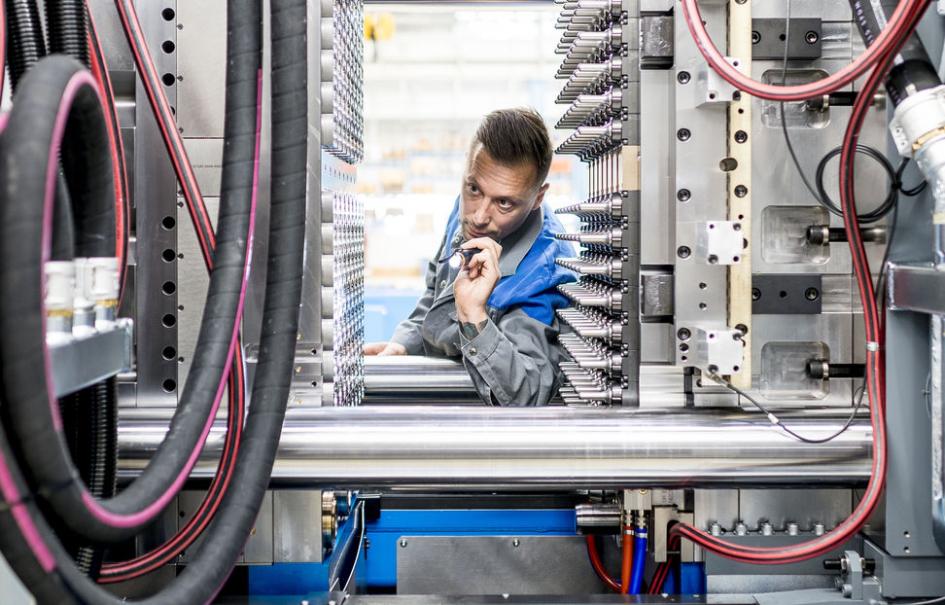Mr. Burger, you are Head of Industry 4.0 at Bosch Packaging Systems AG, Beringen (CH). What are the main drivers of the fourth industrial revolution in the MEM industry, and how is your company promoting them?
The main driver is above all the ease and ubiquity of internet access compared to the past (10 to 15 years earlier) and the ever increasing affordability of hardware such as computers, sensors and actuators. This also includes the ability to more easily and quickly save and process data and perform and visualize calculations thanks to increased and cheaper computing power.
Another driver is the consumer goods sector, which has advanced the provision of services using apps. These services are now widely used, including in industry; storing data in a cloud (decentralized data processing center), for example, and making it available in a global organization.
The third driver is our changing society. People in today's communication-based society want to be able to use the advantages they enjoy in their private lives – thanks to apps, mobile devices, the internet and other hardware – in their professional lives. This trend is being driven in particular by digital natives (Generation Y) who have grown up with the above-mentioned technologies.
Robert Bosch GmbH itself is involved in the joint project "Plattform Industry 4.0" in Germany. The project is a collaboration between the German industry associations BITKOM, VDMA and ZVEI for the development and implementation of the future project "Industry 4.0."
In your opinion, what is the significance of digitization in global trade?
Digitization affects some areas in global value chains. These include production processes on the one hand and supply processes, logistics and purchasing on the other. The processes in purchasing had already been "digitized" about 10 to 15 years ago, for the most part with the Electronic Data Interchange (EDI) connections. One example of this is the automatic exchange of orders between suppliers and producers in SAP.
Nowadays, production facilities try to work without papers as much as possible, all the way from the design department to the machine. This is for the simple reason that the use of paper frequently results in errors, while going digital increases the transparency and rapid processing of data.
But I should add here that this isn't new. Computer Integrated Manufacturing (CIM) had already been introduced in the 80's, although the hardware, software and networks at the time were not as efficient as they are today.
The third element is rapid processing from production to the customer. Companies want to know that their products will make it safely to their customers. Today this is possible with digitization, through tracking and the use of sensors, for example. Sensors with GPS modules, humidity, temperature and position sensors allow businesses to easily track the state of a product from the factory to the customer. The logistics sector and in particular package delivery have been successfully active in this area for many years now.
Many clients are still not aware that they need to participate in digitization in order to remain competitive. Would you agree with that, and how would you go about making the argument for awareness, particularly in the MEM industry?
Our clients are large international companies as well as SMEs. Awareness is sporadic, particularly when it comes to global companies. Bosch Packaging Systems AG is trying, among other things, to support clients in their processes and their daily business using mobile applications and software applications.
Clients can only be persuaded when they are presented with added value – put simply, creating transparency in production, reducing costs but also supporting speeding up customers' production – in short, an increase in productivity. Ultimately, the product, chocolate or cookies for example, has to end up on the shelf for sale faster.
Are future trends in digitization already evident, and what does this mean for export-oriented Swiss SMEs?
The long-term trend is moving towards "platforms," both inside and outside factories; platforms that can bundle services or applications, which customers can retrieve with a (networked) device. These can be software products and services, for example. Microsoft Office 365, for example, which can be acquired on an annual basis, so you only pay when you actually need the product or service. Similar things are possible in industry. One possibility is a cloud connection (external data center), cloud services or cloud computing (e.g. algorithms/programs for trend calculation). These services are then retrieved via a simple internet connection.
SMEs should take system openness into account in their development, and not develop standalone solutions. It's important to think about interfaces. Software and hardware architecture should be open for connecting to other systems; that their machines, for example, can be connected to a Manufacturing Execution System (MES) for capturing machine and operating data. A MES makes machine and production data transparent – in real time. This facilitates production and delivery planning.
S-GE Impulse: MEM at Sindex in Bern
On September 8, as part of Sindex in Bern, the S-GE Impulse: MEM will be held. S-GE members will receive an exclusive tour of the fair from SwissT.net.
About Norbert Burger
Mr Burger is Head of Industry 4.0 at Bosch Packaging Systems AG, Beringen (CH). He coordinates the interdisciplinary product and service developments on-site, working closely with other locations. On September 8, he will give a presentation at the S-GE Impulse Event at the Sindex fair in Bern. He will discuss the influence of networking and digitization, particularly taking new developments into account, and his experience, using the example of a manufacturer of packaging machines.
About Bosch Packaging Systems AG
Bosch Packaging Technology is a division of Robert Bosch GmbH. The division is a leading global provider of filling, processing and packaging technology. The product division Confectionary and Food Service is located in Beringen (CH) and has a total of more than 700 employees.
More information about Industry 4.0







